Japan-North Korea Relations
Efforts by the International Community
In order to resolve the abductions issue, it is essential for Japan not only to proactively urge North Korea, but also to gain support and cooperation from other countries regarding the importance of resolving the abductions issue. Therefore, the GoJ has raised the issue at every diplomatic opportunity. It is known that there are also many ROK people who were abducted by North Korea. Testimony from returned Japanese abductees and others has further revealed that there are people from Thailand, Romania, and Lebanon who may have been abducted by North Korea. It has also been said, according to the testimony from abductees of the ROK who have returned from North Korea and from others, that Chinese and other nationals have also been abducted.
As detailed above, abduction by North Korea constitutes a universal issue among the international community as a violation of fundamental human rights.
1. United Nations

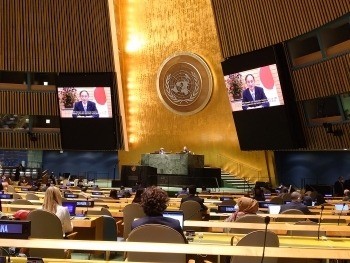
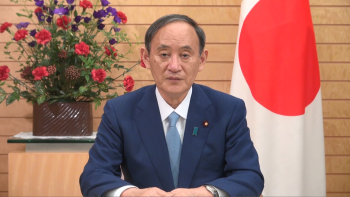
Mr. SUGA, then Prime Minister of Japan, during a speech at the General Debate Session in the UN General Assembly (September 2021)
- (a) In the United Nations, the resolutions on the Situation of Human Rights in the DPRK, which include reference to the abductions issue, have been adopted at the Human Rights Council 14 times for 14 consecutive years and at the General Assembly 17 times for 17 consecutive years (as of December 2021). The resolution adopted by the UN General Assembly in December 2021, stress again with the grave concern the urgency and importance of the issue of international abductions and of the immediate return of all abductees, as they and their family members age, expresses grave concern about the long years of severe suffering experienced by abductees and their families, and the lack of positive action by North Korea, notably since the investigations on all the Japanese nationals commenced on the basis of the government-level consultations held between Japan and North Korea in May 2014, and strongly demands that North Korea address all allegations of enforced disappearances, faithfully provide accurate and detailed information to the families of the victims on the fates and whereabouts of their missing relatives and resolve all issues related to all abductees, in particular the realization of the immediate return of all abductees of Japan and the ROK. Furthermore, the resolution condemns the systematic abduction, denial of repatriation and subsequent enforced disappearance of persons, including those from other countries, on a large scale and as a matter of State policy, and in this regard strongly calls upon North Korea to urgently resolve these issues of international grave concern, in a transparent manner, including by ensuring the realization of the immediate return of all abductees.
- (b) At the Human Rights Council in March 2013, the Resolution on the Situation of Human Rights in the DPRK that includes the establishment of a Commission of Inquiry (COI) was adopted by consensus (without voting). The COI has investigated the human rights situation in North Korea including the abductions issue through their visits to Japan, the ROK, the U.S., the United Kingdom and Thailand, and has released their final report (COI report) in February 2014.
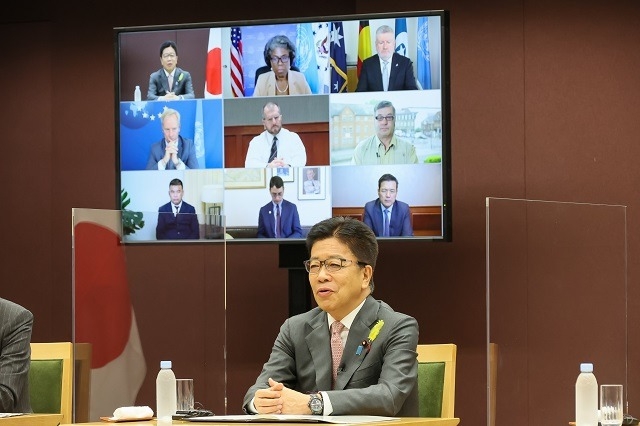
Mr. KATO, then Chief Cabinet Secretary and Minister in Charge of the Abduction Issue, during a keynote speech at an international symposium at the UN Headquarters (June 2021)
- (c) In December 2014, UNSC discussed the situation in North Korea comprehensively, including the human rights situation. Since then, UNSC held four meetings on “the situation in the DPRK.” Japan has urged the fastest possible resolution of the North Korean abductions issue at these meetings. In December 2021, an informal UNSC consultation on the human rights situation in North Korea was held, and afterwards, like-minded countries, including Japan, issued a joint statement, which strongly urges the resolution of the abductions issue, particularly the immediate return of the abductees.(d) In addition, the GoJ has sought to disseminate information and strengthen coordination with the international community, including hosting international symposiums at the UN Headquarters and other locations. In June 2021, an online symposium on the abductions issue was held as a side event of the UN, co-hosted by the governments of Japan, the U.S., Australia, and by the delegation of the European Union. In the symposium, the voices of parties concerned, including the families of Japanese abductees, were conveyed to the international community, and a panel discussion was held among Japanese, U.S., and ROK experts on North Korea issues. In this way, the symposium called for the understanding and cooperation of the international community towards the immediate resolution of the abductions issue.
2. Six-Party Talks
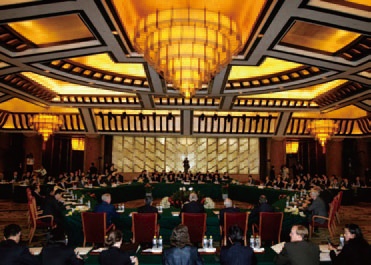 Six-Party Talks (September 2007)
Six-Party Talks (September 2007)Japan has raised the abductions issue at the Six-Party Talks. In fact, taking steps to normalize relations between Japan and North Korea, on the basis of the settlement of the abductions issues and other outstanding issues of concern, was set as one of the goals in the September 2005 Joint Statement of the Six-Party Talks. Based on this goal, during the Six-Party Talks held in February 2007, the decision for the establishment of a Working Group for the “Normalization of DPRK-Japan Relations” was incorporated in an outcome document.
At the Six-Party Talks held in October 2007, it was reaffirmed in another outcome document that “the DPRK and Japan will make a sincere effort to normalize relations expeditiously in accordance with the Pyongyang Declaration, on the basis of the settlement of ‘the unfortunate past’ and the outstanding issues of concern,” and that “the DPRK and Japan have committed themselves to taking specific actions towards this end through intensive consultations between them.” The abductions issue is no doubt included in the “outstanding issues of concern."
3. Multilateral Frameworks

G7 Cornwall Summit (June 2021)
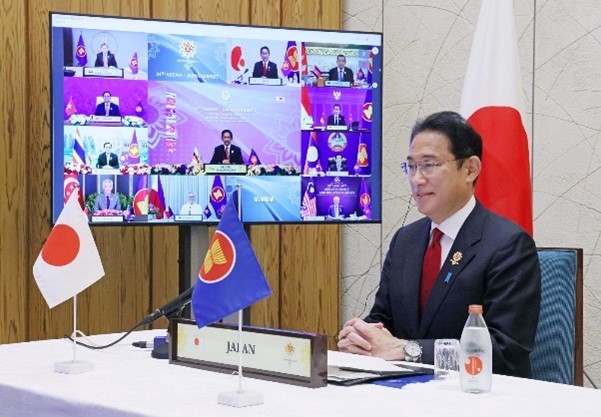
ASEAN-Japan Summit Meeting (October 2021)
The GoJ has raised the abductions issue in multilateral frameworks, including the G7 summit, the Japan-Australia-India-U.S. summit meetings and the ASEAN related summit meetings, and the importance of resolving the abductions issue and efforts the GoJ has been making towards this end have gained the clear understanding and support of other nations.
For example, at the G7 Cornwall Summit in June 2021, then Prime Minister Suga asked for the G7 members’ full understanding and cooperation on the abductions issue as a top priority of his administration. All G7 leaders supported his view and the G7 Leaders' Communiqué explicitly mentions that the G7 members once again call on North Korea to resolve the abductions issue immediately.
In addition, at the Japan-Australia-India-U.S. Summit Meeting in September 2021, then Prime Minister Suga asked for the leaders’understanding and cooperation towards an immediate resolution of the abductions issue, and gained support from each country. The Joint Statement from Quad Leaders stated, “We reaffirm our commitment to the complete denuclearization of North Korea in accordance with United Nations Security Council resolutions, and also confirm the necessity of immediate resolution of the issue of Japanese abductees.”
Furthermore, in the ASEAN-related Summit meetings in October 2021, Prime Minister Kishida asked for the continued understanding and cooperation of each country towards the immediate resolution of the abductions issue. Prime Minister Kishida obtained their support for the resolution of the abductions issue, and as a result, reference to the importance of the immediate resolution of the abductions issue was included in the Chairman's Statement.
4. Bilateral Consultations
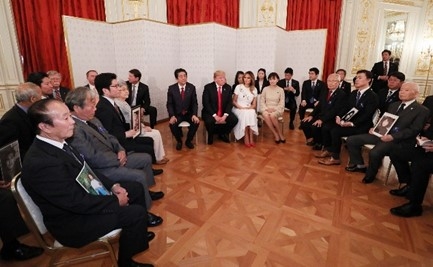
Meeting between President Trump and Family Members of the Abductees (May 2019)
The GoJ has addressed the abductions issue at bilateral summit talks and foreign ministerial meetings with countries such as the United States, the ROK, China and Russia, who offer their understanding and support for the position of Japan.
For example, with regard to the United States, based on a request from then Prime Minister Abe, then President Trump took up the abductions issue with Kim Jong-Un, Chairman of the State Affairs Commission, at the first U.S.-North Korea summit meeting in June 2018. In addition, at the second U.S.-North Korea summit meeting in February 2019, then President Trump raised the abductions issue with Chairman Kim Jong-Un during the first tête-à-tête meeting held on the first day, and clearly conveyed then Prime Minister Abe’s views regarding the abductions issue to the Chairman. At the small group dinner that followed, then President Trump once again raised the abductions issue, and a serious discussion took place between the leaders. When then President Trump visited Japan in November 2017 and May 2019, he met with the family members of the abductees and listened attentively to the family members’ emotional pleas, while offering them encouragement and courage.
In addition, following his inauguration in September 2021, Prime Minister Kishida, in the Japan-U.S. summit telephone talk with President Biden in October, asked for continued understanding and cooperation toward the immediate resolution of the abductions issue, to which President Biden offered his support. Also at the Japan-U.S. Summit video telephone meeting in January 2022, Prime Minister Kishida asked for continued understanding and cooperation toward the immediate resolution of the abductions issue, to which President Biden offered his renewed support.Furthermore, the ROK has also been raising the abductions issue with North Korea on successive occasions, including the Inter-Korean Summit in April 2018. At the Japan-ROK Summit in December 2019, President Moon Jae-In expressed understanding for Japan’s position on the importance of the abductions issue, and stated that the ROK has repeatedly brought up the abductions issue with North Korea. At the Japan-ROK summit telephone talks with President Moon Jae-in, in October 2021, Prime Minister Kishida asked for continued support and cooperation on the abductions issue and President Moon expressed his support for Japan's position. With regard to China, at the Japan-China Summit in June 2019, President Xi Jinping stated that, at the China-North Korea Summit held in the same month, he conveyed then Prime Minister Abe’s views concerning Japan-North Korea relations to Chairman Kim Jong-Un. Japan also gained the strong support of President Xi for improvement of Japan-North Korea relations, including the abductions issue. At the Japan-China summit telephone talks with President Xi in October 2021, Prime Minister Kishida raised the issue of North Korea, including the abductions issue, and the two leaders confirmed that Japan and China would continue to cooperate with each other.
Draft Resolution Concerning a US Citizen Possibly Abducted by North Korea
In the U.S. Congress, a draft resolution, which urged the U.S. Government to coordinate investigations with the governments of Japan, China, and the ROK on a U.S. citizen possibly abducted by North Korea, was approved and passed in the regular session of the House of Representatives in September 2016. In addition, an identical draft resolution was approved and passed in the regular session of the Senate in November 2018.


